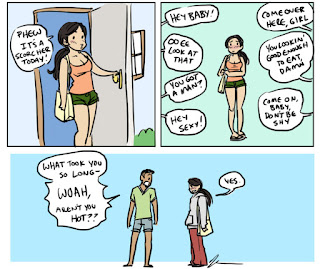 |
| via artist Kendrawcandraw |
Since the story of Adam and Eve, bodies have become a source of shame. In modern day, that translates to judging every inch of a women's body. "Catcalling, or policing what girls can wear... is intended to make women feel insecure in public spaces—to remind us that, no matter what our own ambitions or goals may be, if we are in public, we exist to be looked at and judged," states Sady Doyle in her article published in Elle. This doesn't only begin during adulthood, it's introduced in public schools from a young age.
Dress codes are one source that teaches women shame from a young age. Aaliyah Anderson from the Odyssey Online explains that: "Despite whether certain dress codes should be in effect or not, when it comes to girls being punished and sent home from school for wearing shorts on a hot day because their clothing is deemed "distracting," says a great deal about the mindset in our society." Instead of penalizing the girls for dressing to be comfortable, we should be swaying the conversation towards the issue concerning boys and men who cannot control themselves around women's bodies – as if their self-control equivalent to that of wild animals. Additionally, many young girls are required to get their prom dresses approved by their school staff to make sure that they would not cause a distraction to the other male students and male teachers. Young girls at school are being sent mixed messages: one telling them they shouldn't dress a certain way, and the other reminding them that "boys expect girls to be perfect and beautiful and skinny” (Kilbourne 124) – thus implying that they must dress to impress.
 |
| via Everyday Feminism |
Not only are dress codes a factor that women get comments on, but their own bodies are often harshly criticized. Most advertisements on television show this "ideal" body type that they try and persuade a women to work towards. Often tall, skinny and blonde, "the voice of the magazine gives women an invisible female authority figure to admire and obey” (Wolf 74). Therefore, you could conclude that these advertisements, that women cannot avoid, would attempt to cement this image in a women's mind. John Berger clarifies that, "the commercial image steals her love of herself as she is, and offers it back to her for the price of the product” (Kilbourne 123).
Often these commercials would introduce body shaming towards women in order to potentially influence them to buy their product. As Wkyes and Gunther point out, “At worst, they will feel justified in trying to shrink because our culture writes sex and success on the body” (Gunther 219). In some cases of advertisements, "The message to women is explicit: 'Indulge in a little'" (Bordo 129). Since images of skinny (but curved all in the "right places") women flood the walls of public space, the internet, and television, advertisers show that would do whatever it takes to get their message across – that a women should obey them and their ideals to be accepted in their society.
 |
| via Pintrest |
From one source women are told that they should "cover up," but from others, they must be sexy and seductive, since that is what they are told it means to be "successful" according to media. The message sent to women and girls in society is that women are always supposed to look a certain way to please men. Thus, women's bodies are continued to be policed in order to appeal to the man. Whether it be to make sure the man is not distracted by them or, as stated in The Beauty Myth, to make sure that women are kept as "'beauties' in men's culture so that culture could be kept male" (Wolfe 59). Although, the big media companies are the one's that are in charge of distributing these harmful messages body shaming through body policing, we have a great tool that we may use to combat those messages: the internet. Not all of the web may be filled with body positivity, but that does not mean that we cannot spread these messages of misogyny and body policing. The more awareness the issue receives, the more women would strive towards fighting against media's patriarchal beauty standards. It must start from the people who may filter out their media and create new body positive messages.
 |
| via Feminist Figure Girl's Blog |
Works Cited
Kilbourne, Jean. Beauty and the Beast of Advertising. 1999.
Wolfe, Naomi. The Beauty Myth. Vintage Books, 1990.
Wykes, Maggie, and Barrie Gunter. The Media and Body Image: If Looks Could Kill. SAGE, 2010.




I love the presentation of your blog! Especially the picture next to the work cited, very original!
ReplyDeleteI like how you mentioned " Since Adam and Eve.." I wish you would have taken it a step further and perhaps discussed the original sin. Adam & Eve were naked in the Garden of Eden. How did we end up in a society where women are policed the amount of clothing on.
Really thorough post, thanks for sharing!